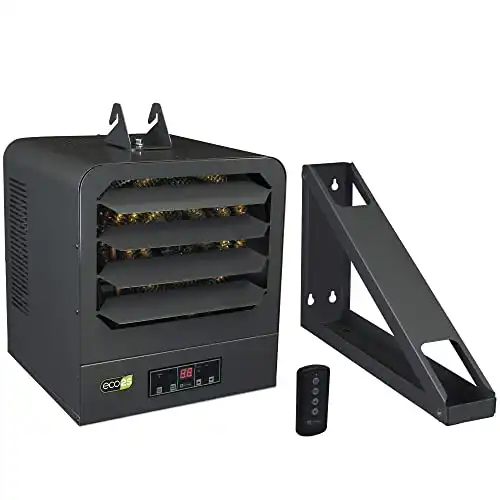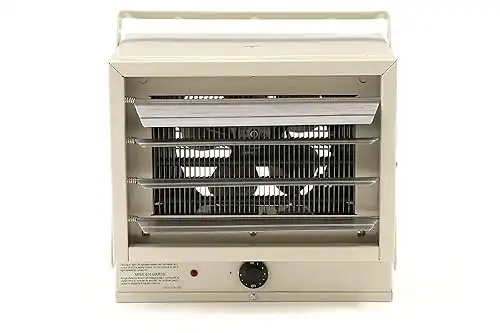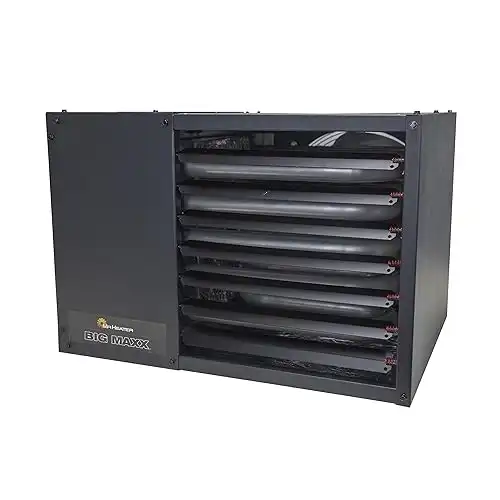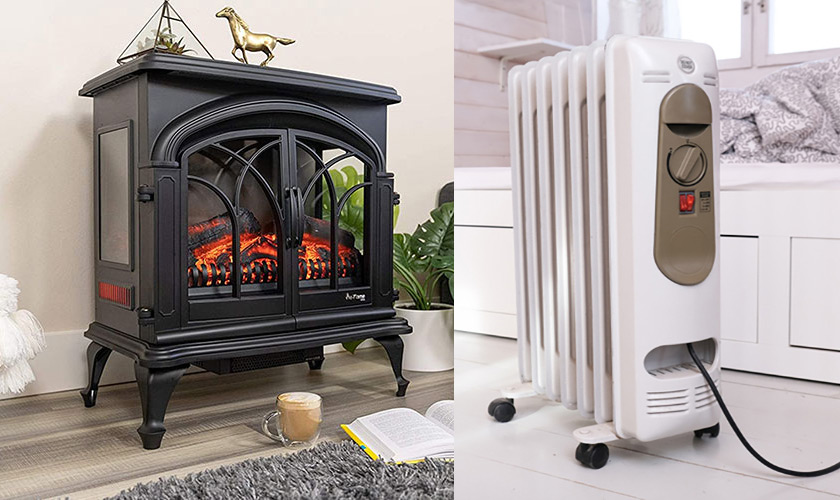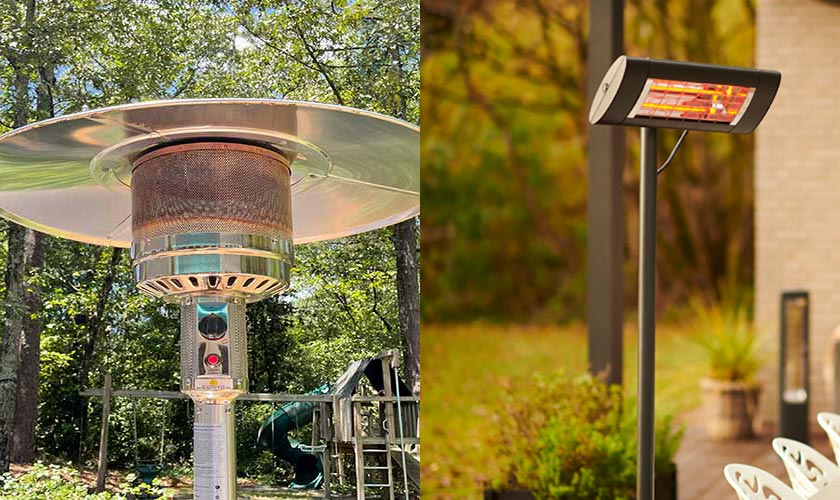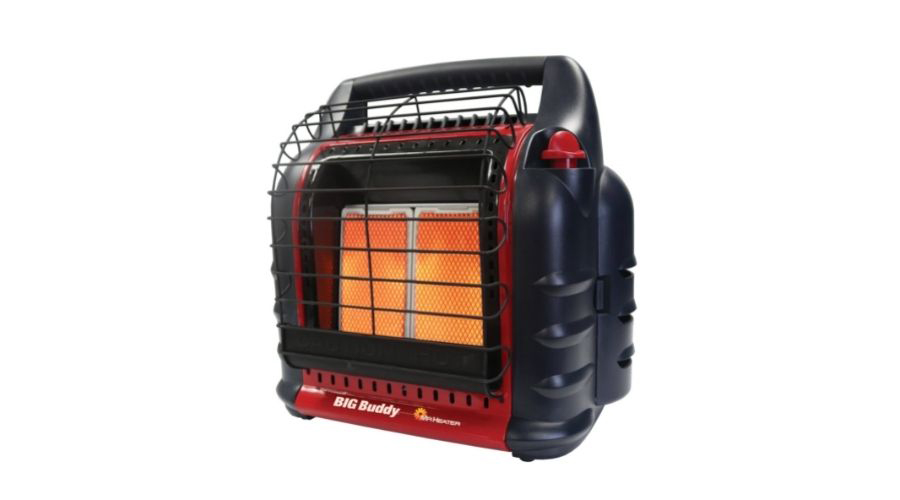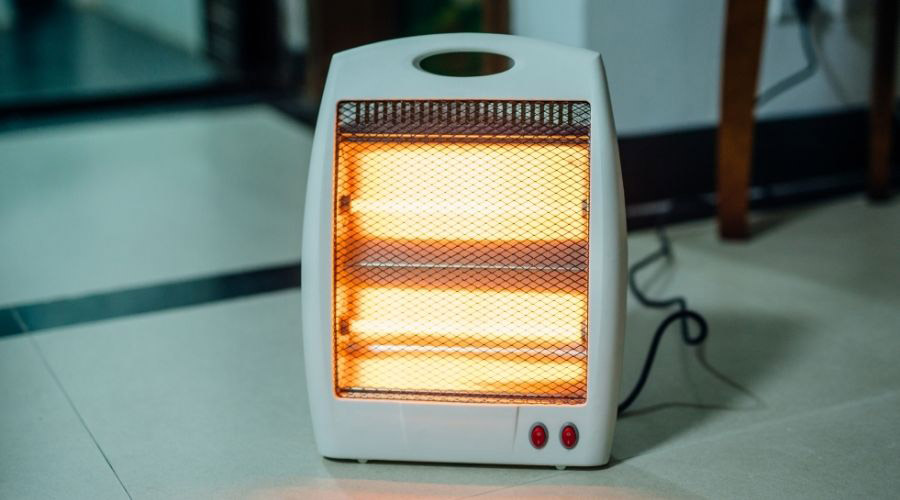
There are many reasons why you would need to use a garage. Some homeowners use it for their side business, whereas others use it for their hangout spot or working on their hobbies.
However, if you are looking up guides on how to go about picking the right portable electric heater, then you have stumbled upon your one-stop shop for all the information you are going to need. One main thing you will get out of this is making an informed decision on which one will best suit your needs.
This article will be divided into key sections: terms, size estimation, chart, differences between gas and electric, and what the different certifications mean. If you already have a healthy idea of what you need more knowledge on, feel free to jump to any section listed above.
What Terms Should You Know About?
Before even taking measurements or figuring out which heater size will benefit your needs the most, it is imperative first to know some of the right terminologies behind these machines.
Understanding these terms will guarantee you find the heater that fits your garage comfortably and doesn’t exceed your recommended wattage or cost you too much throughout your running duration.
1. Wattage Definition
Commonly referred to as watts, wattage is the basic unit of power equivalent to precisely one joule of energy per second. If we were to go for a more direct calculation, a “watt” is measured by amperage (defined as how much electricity flows inside the machine.) Also, the voltage (how much pressure is required to move the electricity from one spot to another.)
In most cases, heaters typically run off roughly 120 volts, but these machines can have varying degrees of amperage. While the standard is 120, some larger machines may double that requirement, pushing 240 volts or more to run.
2. BTU (British Thermal Energy) Definition
Despite that summary, understanding energy consumption with these terms, specifically wattage, can be highly confusing. Thankfully, another definition can bring things into a more easily understood light—this term being (BTU) or British Thermal Units.
A BTU is “the amount of energy required to heat a single pound of water by a single degree,” which translates into about 1055 joules.
If we were to compress this down again, that means a singular watt is equal to slightly under three and a half BTU, so it is easy to see why understanding all of these terms can be a daunting task.
Understanding how many BTUs it will take to increase the overall temperature in your garage will ensure that you’ve picked the right heater for the job.
Another tells of this will be knowing how much of a temperature rise you have and obtaining that number. It would be best if you found the difference between the outside temperature and your desired indoor temperature.
3. R-Value Definition
The final layer of understanding how heating will affect your garage would be what kind of insulation you have and the general effectiveness of the insulation itself.
Typically, this is determined by the R-value and said R-value works as follows, the higher it is, the less heat you will continuously lose over time. In most cases, fiberglass is the go-to standard for home insulation, and it has a respectable range of 2.9 to 3.8.
Checking this rating against all the other provided information will allow you to zero on just the right heater for you, but now that we’ve gone over the terms, let’s get into the size of your garage.
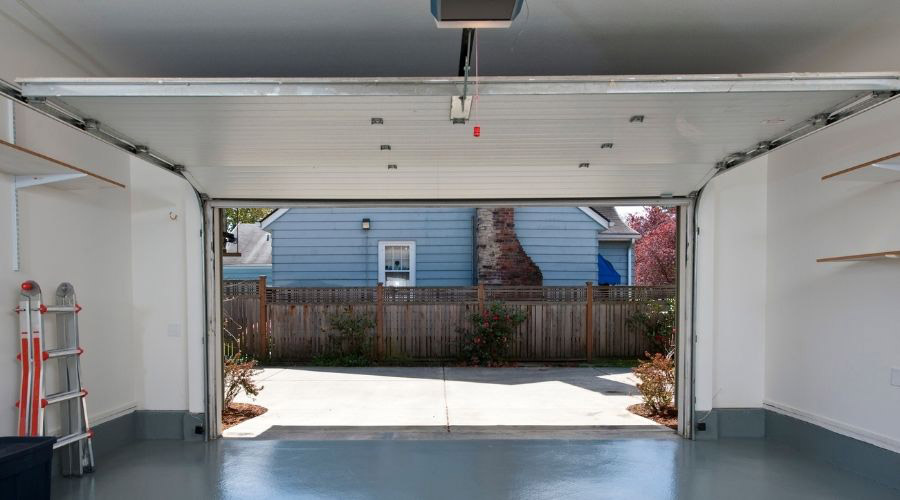
How To Estimate Garage Heater Size
As we went over above, there are effectively two ways to calculate how much energy you need to heat your garage adequately: BTU or wattage. In most cases, watts are considered easier to work with because they are quantified in a ratio of 10 watts per square foot of space.
So, if you were to try and math out an area 20 feet by 24 feet, you would need approximately 4800 watts of power (which is simply the total square footage, 480, multiplied by 10.)
On the other hand, gas heaters are often rated by the amount of BTU they can produce, and the exact calculations of those get trickier by the same token.
If we were to take the amount of wattage required, using our above 4800, then you would need the multiple that by 3.31, which is more or less the amount of BTUs a single watt equates to like we discussed before, then we would find the conclusion that it requires 16368 BTU’s to warm your hypothetical space.
Thankfully we won’t be delving much deeper into the precise math on heating this area in particular. Still, you could pursue these measurements down to the tee if you took the insulation rating we spoke of above into account.
However, that is delving a bit steep into its mathematics, and we can get a fundamental understanding using what we have here.
If you are inclined, multiply the insulation’s R-value into the cubic foot number, but again, such precision isn’t necessary for most people.
Size Guide Charts
1 Car Garage (Up to 450 Square Feet)
| – 70°F inside- 20°F outside | – 70°F inside- 10°F outside | – 70°F inside- 0°F outside | |
|---|---|---|---|
| Insulated Garage | |||
| 8 ft ceiling | 3700 watts | 4400 watts | 5150 watts |
| 10 ft ceiling | 4050 watts | 4850 watts | 5650 watts |
| 12 ft ceiling | 4400 watts | 5300 watts | 6200 watts |
| Non-Insulated Garage | |||
| 8 ft ceiling | 11000 watts | 13200 watts | 15350 watts |
| 10 ft ceiling | 12100 watts | 14500 watts | 17000 watts |
| 12 ft ceiling | 13200 watts | 15900 watts | 18500 watts |
2 Car Garage (Up to 700 Square Feet)
| – 70°F inside- 20°F outside | – 70°F inside- 10°F outside | – 70°F inside- 0°F outside | |
|---|---|---|---|
| Insulated Garage | |||
| 8 ft ceiling | 3700 watts | 4400 watts | 5150 watts |
| 10 ft ceiling | 4050 watts | 4850 watts | 5650 watts |
| 12 ft ceiling | 4400 watts | 5300 watts | 6200 watts |
| Non-Insulated Garage | |||
| 8 ft ceiling | 17100 watts | 20500 watts | 23900 watts |
| 10 ft ceiling | 18800 watts | 22550 watts | 26300 watts |
| 12 ft ceiling | 20500 watts | 24600 watts | 28700 watts |
3 Car Garage (Up to 900 Square Feet)
| – 70°F inside- 20°F outside | – 70°F inside- 10°F outside | – 70°F inside- 0°F outside | |
|---|---|---|---|
| Insulated Garage | |||
| 8 ft ceiling | 8200 watts | 9900 watts | 9900 watts |
| 10 ft ceiling | 9900 watts | 10900 watts | 11850 watts |
| 12 ft ceiling | 11500 watts | 12600 watts | 13800 watts |
| Non-Insulated Garage | |||
| 8 ft ceiling | 24600 watts | 27100 watts | 29600 watts |
| 10 ft ceiling | 29600 watts | 32500 watts | 35500 watts |
| 12 ft ceiling | 34500 watts | 37900 watts | 41400 watts |
4 Car Garage (Up to 1100 Square Feet)
| – 70°F inside- 20°F outside | – 70°F inside- 10°F outside | – 70°F inside- 0°F outside | |
|---|---|---|---|
| Insulated Garage | |||
| 8 ft ceiling | 9800 watts | 11750 watts | 13700 watts |
| 10 ft ceiling | 10800 watts | 12950 watts | 15100 watts |
| 12 ft ceiling | 11800 watts | 14100 watts | 16500 watts |
| Non-Insulated Garage | |||
| 8 ft ceiling | 29400 watts | 35250 watts | 41100 watts |
| 10 ft ceiling | 32300 watts | 38800 watts | 42200 watts |
| 12 ft ceiling | 35300 watts | 42300 watts | 49400 watts |
Two Different Types of Heaters For Your Garage:
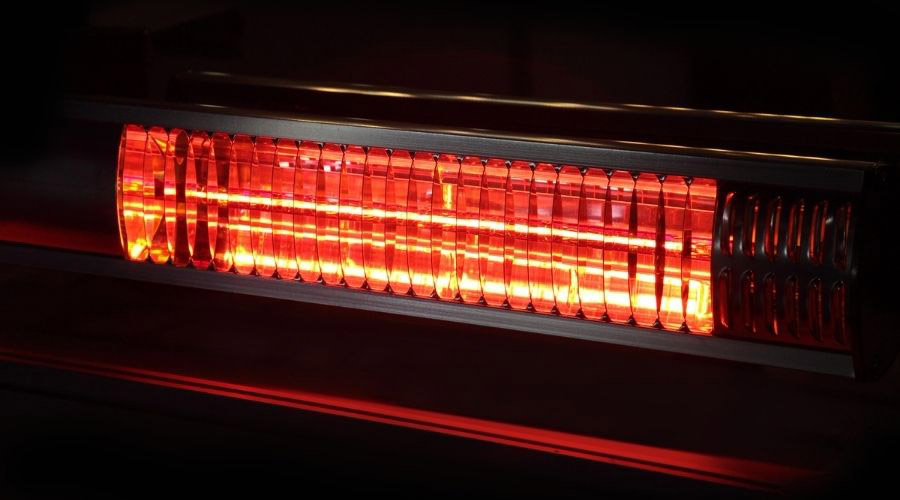
1. Electric Heaters
Electric heaters are one of the main ways people heat their garage. Most of these heaters are very affordable and nearly 100% effective. They are also straightforward to use, as you plug them in anywhere as needed.
Since electric heaters do not absorb oxygen or emit toxic combustion gases as gas heaters do, they are relatively safe to be in a garage.
It is imperative to note that these heaters should remain a safe 3 feet away from any objects to ensure more safety for you. Wall and unit heaters are much less costly and more efficient to mount than equivalent gas-powered heaters.
There are many forms of electric heaters, and some are better suited than others when it comes to garage heaters. We will be going over a couple of examples down below.
Benefits Of An Electric Heater:
- Fast heating in enclosed spaces
- Reliable
- 100% efficient
- No open flame
- Compact
- No wasting of fumes
- Reliable
- Lightweight
- Simple thermostat controls
This space heater is an excellent choice for your garage because it has 3 different max wattage settings of 5000, 7500, or 10000. All three of these options come at different prices, so make sure to find out what garage size you have before purchasing.
This heater works more efficiently instead of harder by providing energy consumption, user control of the built-in electronic thermostat, and unparalleled heating.
Not only that, but the KING provides energy-efficient 2-stage heating with an Eco mode, which automatically lowers the wattages being used in the room.
Lastly, it also comes with an integrated fan only and timer modes, an easy-to-install ceiling, wall mounts, and remote control to easily change the temperature in the room.
This heater comes in at 5000 watts output for those with oversized garages and would be a perfect solution for your needs. This model employs fan-forced heating and has mounting brackets that allow you to place it on your ceiling or wall, depending on where you wish to direct it. This heater also has louvers that are easily adjusted to improve directional control.
You will also get various advantages, such as a remote control for long-distance usage, overheating safety, and an adjustable thermostat that will monitor the temperature.
Fahrenheat will automatically turn on or off depending on its reading in heat. Remember that the heater must be directly connected to a 208 or 240-volt grid or plugged into a 208 or 240-volt socket.
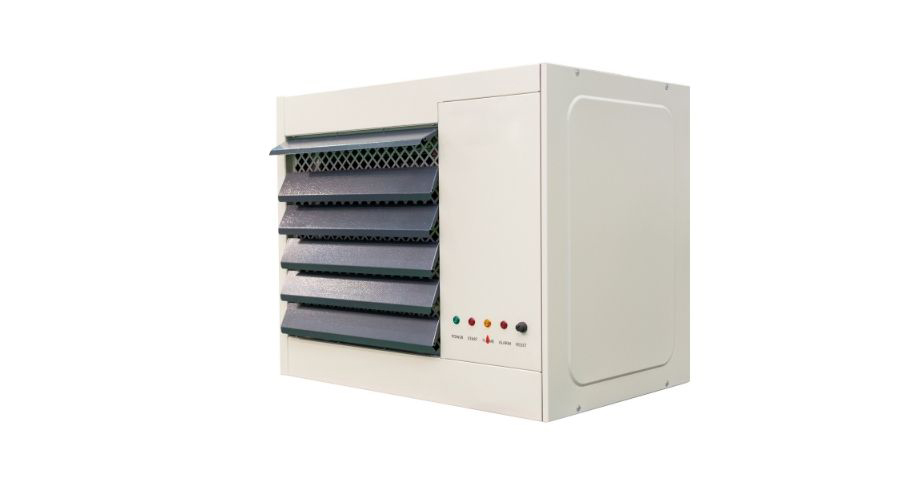
2. Gas Heaters
Although many homeowners prefer electricity, gas is another viable option for heating your garage in most nations. Natural gas is much less costly than liquid propane, although you may not always use it in rural or remote areas. Gas heaters come in many different styles that vary significantly from one another.
Portable propane heaters are relatively cheap to come by and provide a lot of BTUs for your money. They will also consume a lot of oxygen and produce combustible gases such as carbon monoxide, so it is essential to provide good air circulation.
Benefits Of A Gas Heater:
- Durable
- Fast heating
- Cheap to operate
- Covers large areas
- Powerful
- Adjustable louvers to direct heat
- Fast heating
- Large size selection
This small yet powerful heater is one of the most popular heaters of all time when it comes to heating your garage. Not only that, but these heaters are very much ideal for personal heating because they can be placed on work surfaces or floors to provide supplemental and close-up warmth.
They can also be picked up and moved wherever suits your needs, so if you are working in multiple areas of your garage, then it would be ideal. These heaters are also compatible with a minimum cylinder size of 1 pound.
This heater is perfect for turning your garage into a workspace. It is even good for larger areas, such as your barn.
This heater comes at 80,000 BTU and uses a built-in electric high-velocity fan to pull cool air into the rear of the heater and across a heat exchanger. It will then force the warm air into the area, making the space cozier.
Mr. Heater warms up to 2000 square feet and requires a minimum of 8 feet clearance from the floor to the heater base.
This heater will only require 115v AC power, and you can vent it horizontally and vertically. It even has a mounting clearance of an inch, a supplied bracket, a thermostat connection, and external access to power, so the installation process is relatively easy.
Other Things To Consider
You should consider some safety features when purchasing the right heater for your garage. Let us briefly go over each one, shall we?
- UL Certification: These certifications correct the wire sizes and determine whether the divide can handle the amount of current they say they can. Products are also constructed correctly to provide safety functions within your home.
- ETL Certification: Standing for Electrical Testing Laboratories, this company tests parts and components of various products to ensure they are in line with the established standards.
- CUL Certification: This certification makes sure that the product meets the specific and defined requirements needed.
Conclusion
Overall, there are many things to consider when it comes to heating your garage, but one of the main ways to tell what type of heater you need is by knowing the size of your garage and how many watts or BTU’s a space heater provides.
We hope this information has been helpful and wish you the best of luck searching for which garage heater will suit your needs!


